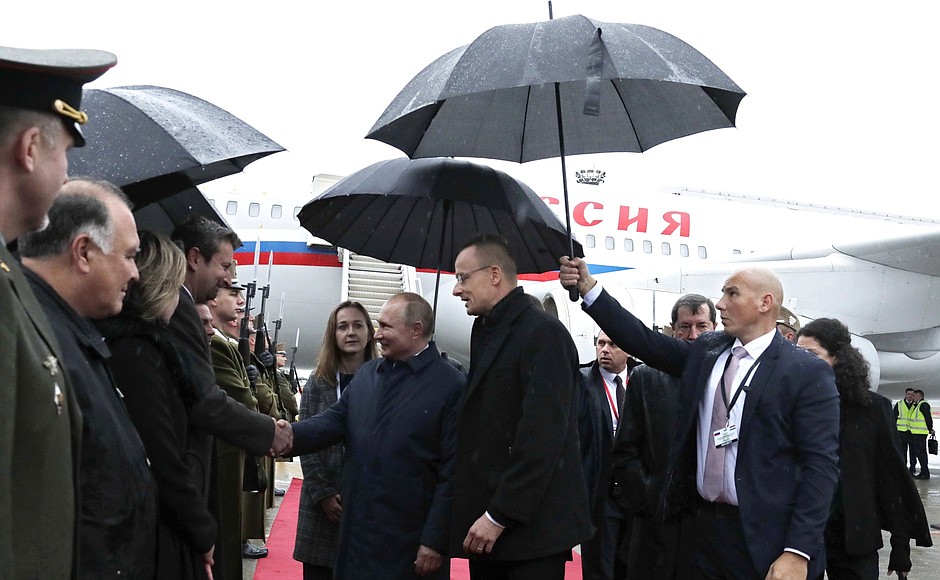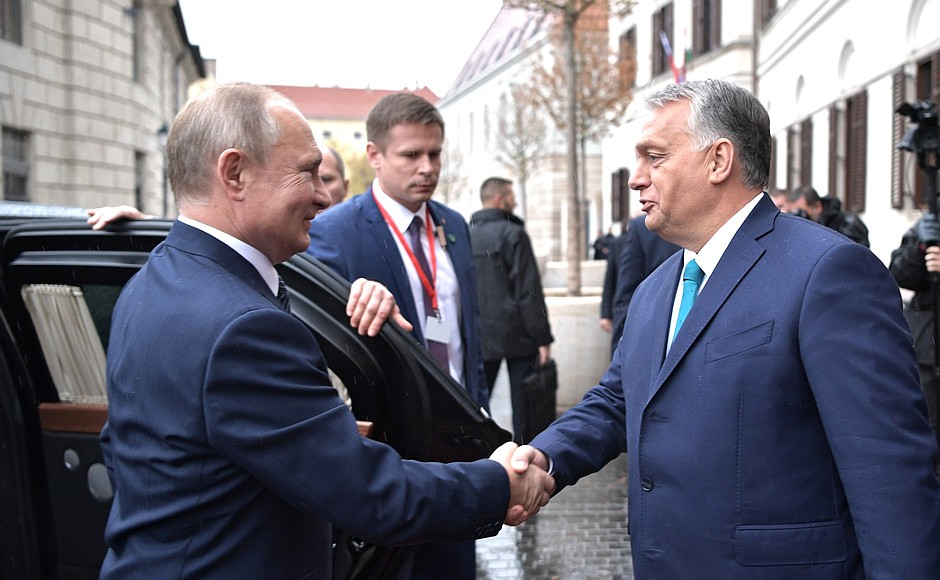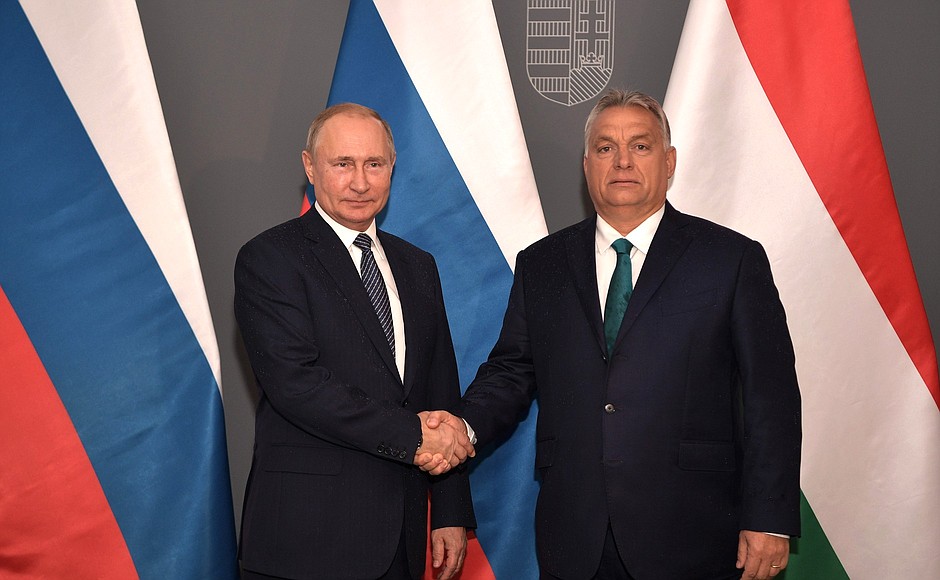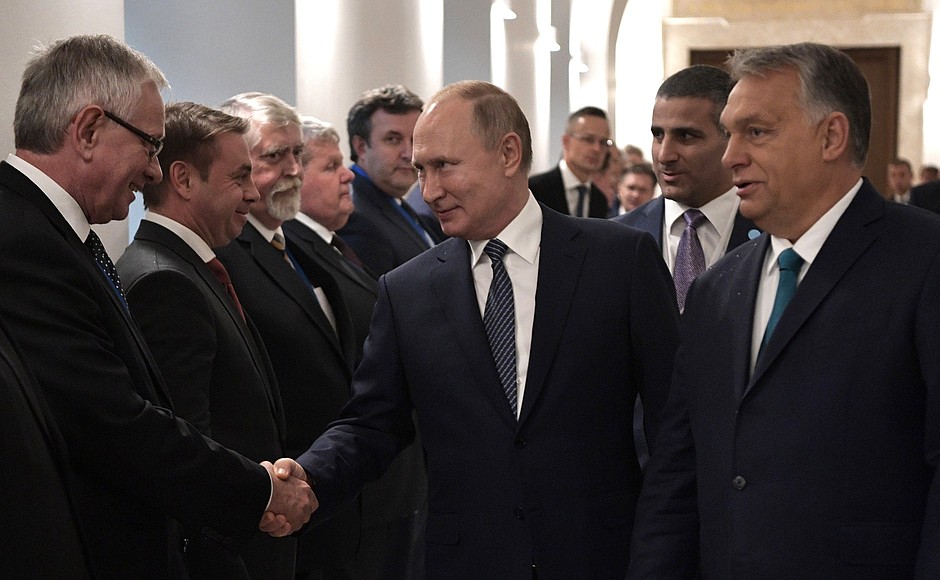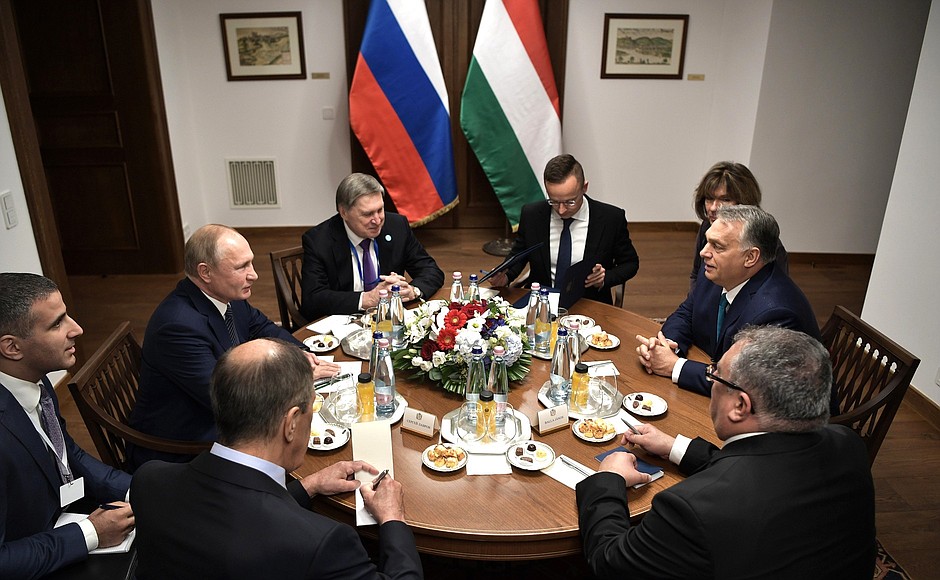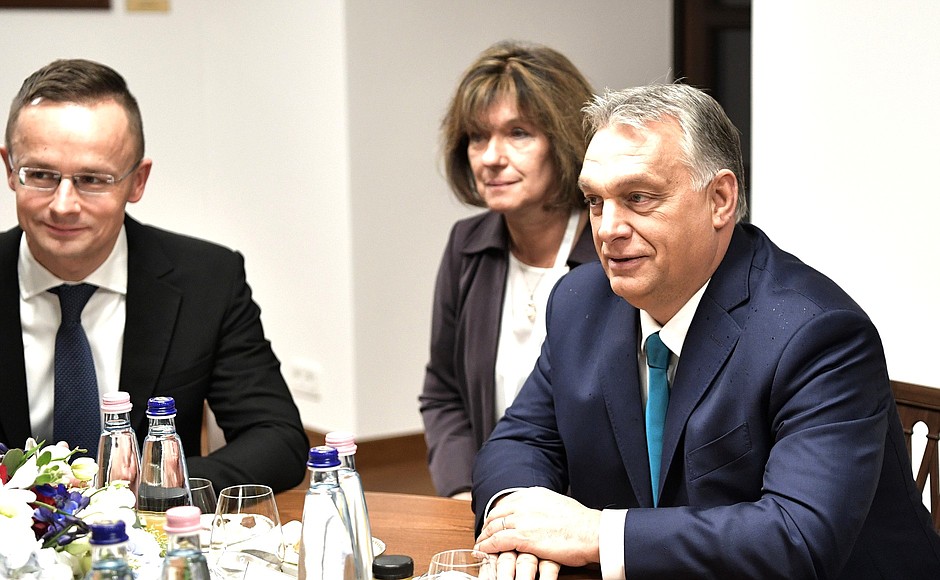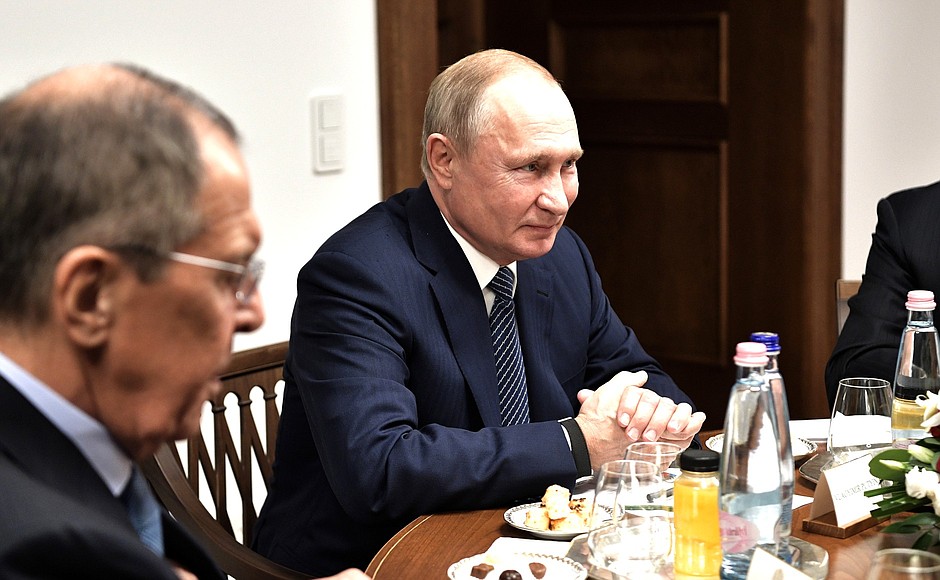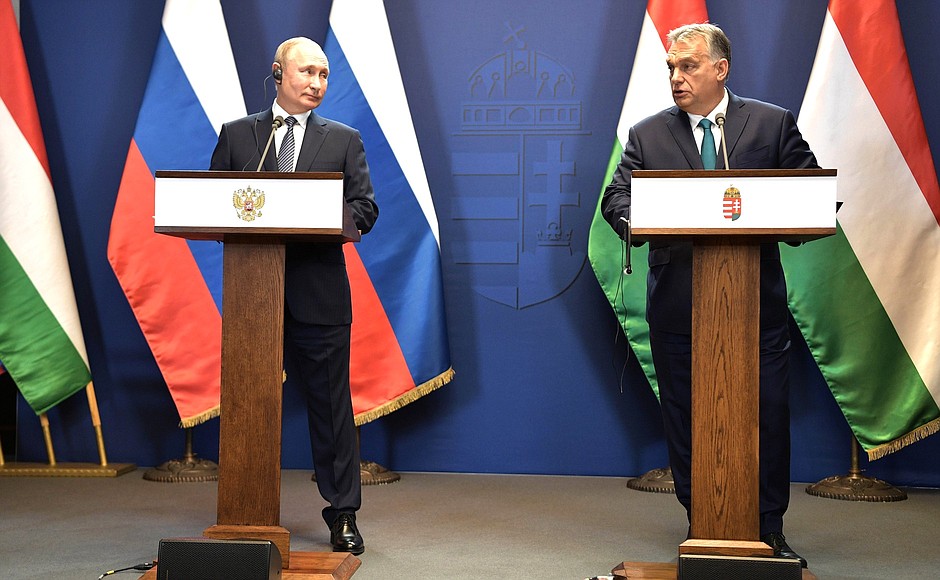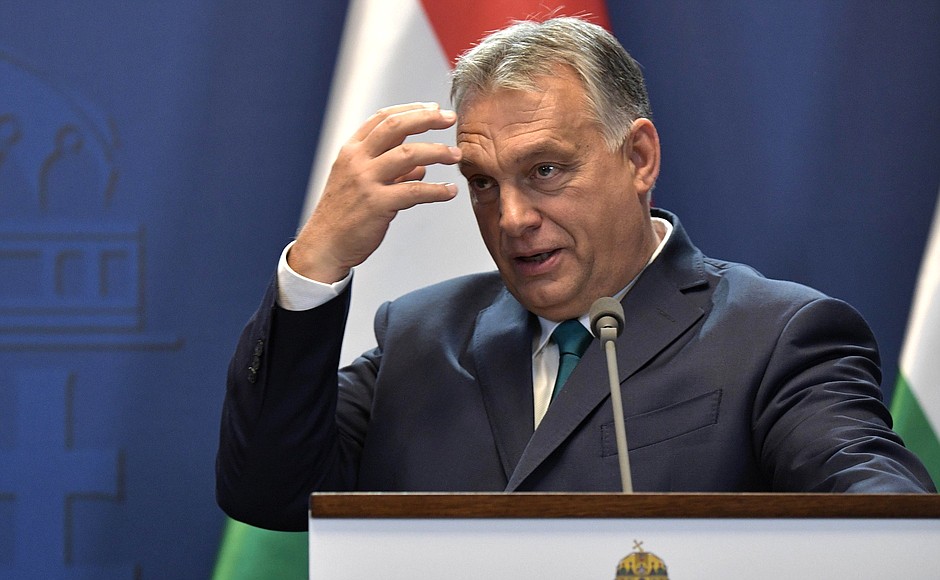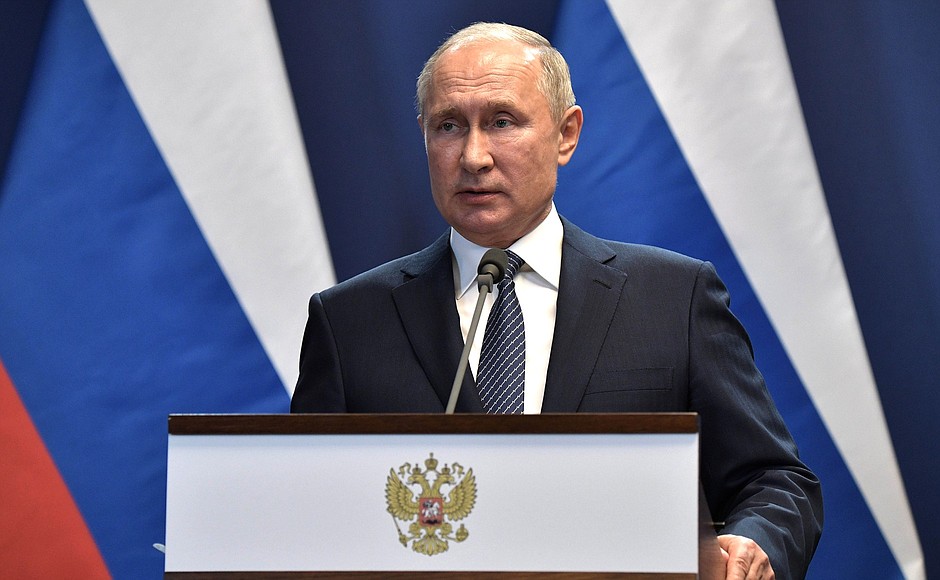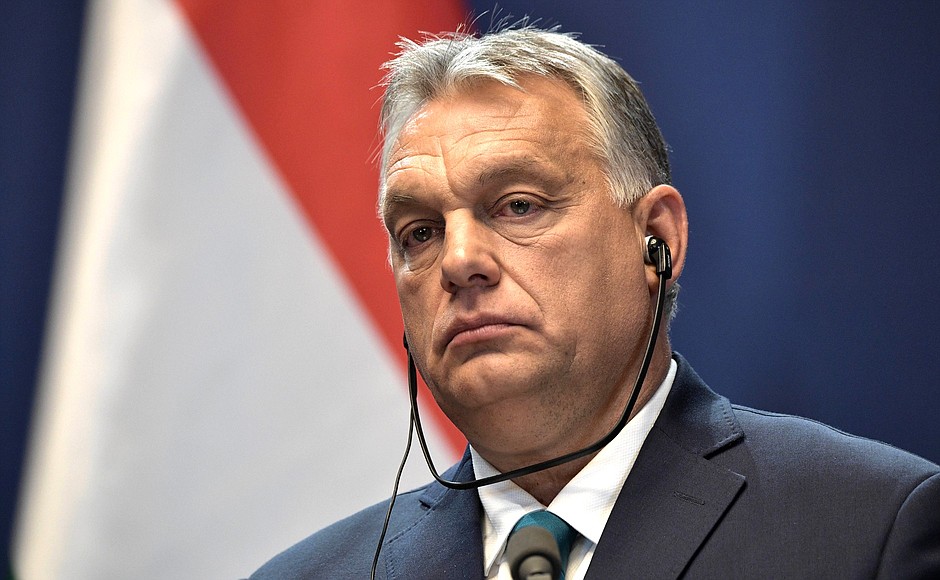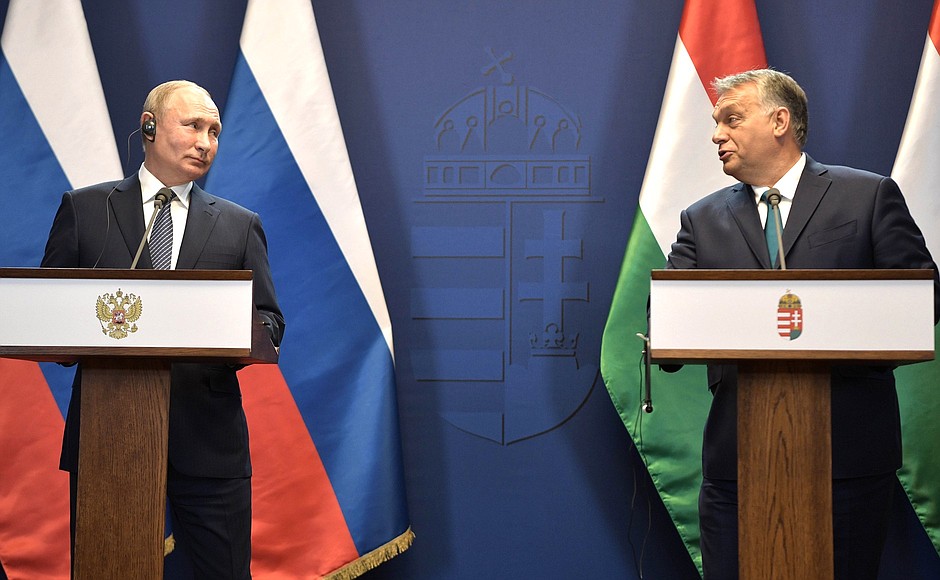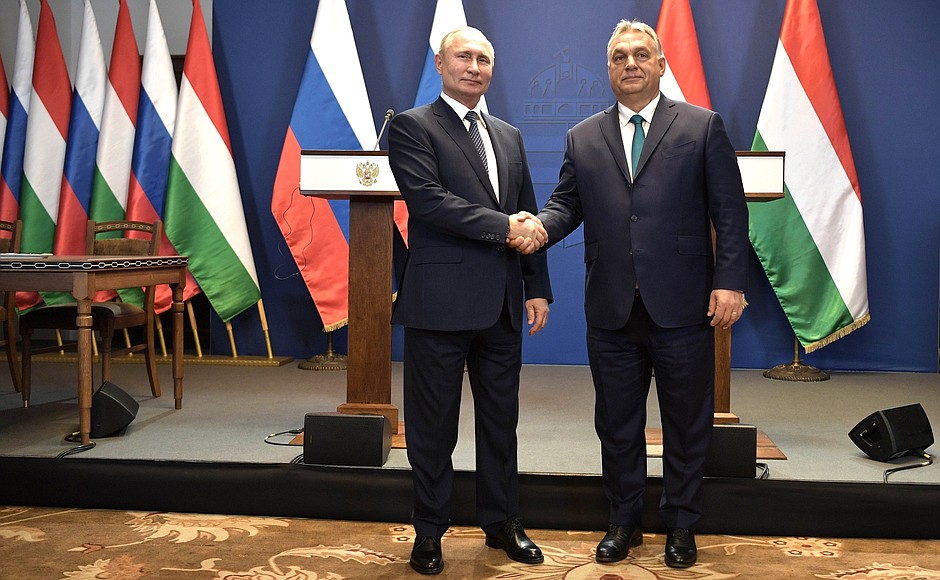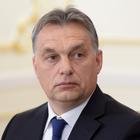Talks between Vladimir Putin and Prime Minister of Hungary Viktor Orban were held at the latter’s residence, the Carmelite Cloister.
The discussion covered the entire range of issues related to Russian-Hungarian cooperation, above all in the field of trade, the economy and culture, as well as several topical international and regional matters.
See also
Following the meeting, a package of agreements was signed in the presence of the leaders, including a plan of measures on implementing a comprehensive programme of Russian-Hungarian interregional cooperation and a treaty between the Russian Federation and Hungary on social security.
The documents signed also include memorandums on cooperation in oncology, physical fitness and sports, and railway transport. In addition, the sides signed a number of agreements on cooperation between Russian oil companies LUKOIL and Transneft and the Hungarian oil and gas corporation MOL Group.
Vladimir Putin and Viktor Orban made statements for the press and replied to media questions.
* * *
News conference following Russian-Hungarian talks
Prime Minister of Hungary Viktor Orban(retranslated): Good afternoon, ladies and gentlemen,
Respectfully, I welcome the President of the Russian Federation and his delegation to the news conference.
Every year for many years now we have been holding a summit between Russia and Hungary to see how our cooperation is going.
When we came up with this method, we set ourselves a goal of taking a step forward every year. This concerns our cooperation in politics and the economy.
Looking back, I must tell you there were successful and less successful years. There were years where we took baby steps forward, but there were years when we made great strides.
This year belongs to the latter category, because if we look at the situation over the past years, we will see that 2018 is the first year after sanctions were imposed on Russia when trade between Hungary and Russia increased.
So, 2018 is critical, because trade exceeded $6 billion and now stands at $6.5 billion.
We never hid Hungary’s plans. In addition to mutual respect, trust also lies at the basis of our cooperation. The facts tell us that Hungary plays a more significant role in this trade, as we purchase oil and gas.
We are trying to balance it out, and are trying to reach an agreement with Russia for us to be able to consider Russia as a place for investing our capital.
Our second goal is to have exportable goods that can be sold in Russia. If we do this right, it will be good for the Russian economy as well. This is a win-win for both our countries.
Of course, there is political cooperation between our two countries. From the Hungarian side, this cooperation is based on a very simple geographical fact: no country can change its house number, as all countries are located where God created them. For Hungary, this means that we are inside the Moscow-Berlin-Istanbul triangle. We have lived here for 1,100 years, and we live here now.
Hungary’s policy is to get every country in the world interested in Hungary’s success, particularly the countries which play a decisive part for us from a regional point of view. Cooperation between Hungary and the Russian Federation fits this description.
Of course, Hungary is a NATO and EU member, and it will stay there. However, this does not rule out the possibility of cooperation with Russia on the political level too. We are seeking it now and will seek it in the future.
Our political cooperation has many important areas. Today we will also meet with the hierarchs of Christian churches in the Middle East, because protecting Christian values is important for us. It is a continuation of the traditions started by Saint Stephen, the first King of Hungary.
We understand each other, we know what dangers it is fraught with. We know about the 96,000 migrants on the Balkan route which are heading north. It poses challenges for us and forces us to provide our borders with special protection. Of course, Russia also has such problems of a different nature concerning border protection and migrants.
Hungary absolutely knows its size, its importance and its place, but it knows its interests too. Hungary also has interests in the Middle East, because if that territory is destabilised, then a great number of migrants will move to Europe and will try to get there via Hungary. Hungary is interested in military and political stability in the Middle East and Syria.
The press usually overlooks it, but I want to emphasise that our cooperation also extends to the Kurds because Hungary is supporting the Kurds in Erbil.
In addition, Hungary is interested in the improvement of relations between NATO and the Russian Federation.
We have such a historical and political experience that if relations between Western and Eastern Europe are tense, Hungary always loses, but if these relations are good, then Hungary stands to gain. Therefore, we are interested (and will be interested in the future) in seeing the best possible relations between Western entities and the Russian Federation.
And in conclusion, ladies and gentlemen, I want to note that you will find the investment lists, but I want to say now that we made investments in the meat industry and pharmaceuticals.
So our cooperation with the Russian Government over the recent years has not only boosted our exports to Russia, for example in terms of seeds we have a place of honour, but we have also increased the number of Hungarian businesses in Russia. So relations between the two countries are very encouraging, from the Hungarian point of view.
And I want to thank the President and the Government of the Russian Federation for this.
Thank you.
President of Russia Vladimir Putin: Mr Prime Minister, ladies and gentlemen,
I would like to begin by thanking Mr Prime Minister for his invitation. He said that over several years, we have established a mechanism of cooperation at the highest level and, judging by everything we see, it works well, considering the progress in our relations, primarily our trade and economic ties.
We discussed in detail the entire range of bilateral relations, summed up the implementation of the agreements reached at previous meetings and mapped out specific plans for the future. The package of documents just signed will definitely facilitate the further deepening of ties between Russia and Hungary.
I would like to note that last year we recorded substantial growth in trade – almost 30 percent. According to our statistics, this is about $7 billion.
The interdepartmental, intergovernmental commission on economic cooperation is in charge of invigorating trade further. At its regular meeting in Moscow two weeks ago, the commission discussed, in practical terms, opportunities for building up bilateral trade.
I would like to note, and I will talk about energy of course, that we are striving to diversify our relations, and I believe we are accomplishing this.
Of course, energy is the most important thing because Russia meets 60 percent of Hungary’s requirements in oil and 50 percent in natural gas. However, the Prime Minister said today that according to Hungarian statistics, in reality this is more than 50 percent.
But this is not the main point. What matters most of all is that we have raised our cooperation to a very high qualitative level and it continues seamlessly.
As you have seen, during this visit, LUKOIL, Transneft and the Hungarian oil and gas corporation MOL Group have signed various agreements. Their implementation will make it possible to increase Russian fuel exports to Hungary via the Druzhba [Friendship] pipeline until 2025.
Russian gas is delivered to Western Europe via Hungary. Its underground gas storage facilities hold enough gas for uninterrupted delivery to customers, including at a time of peak demand.
We view Hungary as one of our priority partners in the field of gas distribution in Europe via both the existing and new northern and southern routes.
We set a high value on Rosatom’s project of building two new power units for the Paks nuclear power station in Hungary. The station’s four power units currently produce over 40 percent of the electricity consumed in Hungary.
The commissioning of additional power units will make it possible to double electricity production and met the growing requirements of the Hungarian economy.
We discussed joint projects in the field of industrial cooperation, including the building and reconstruction of vessels for Hungary’s river fleet. Russian companies have also proposed cooperation in the renovation of Budapest metro trains.
We believe that the signing of an interstate social security agreement is a big step forward in the development of Russian-Hungarian cooperation in the social sphere. Under this agreement, the entire length of service, both in Russia and Hungary, will be taken into account for the calculation of pensions.
Interregional cooperation is an integral part of Russian-Hungarian relations. Our colleagues have just signed an agreement on interregional cooperation, which is actually an embracing document. Nearly all of the regions in Hungary and Russia are cooperating with each other.
Our cultural and humanitarian ties have reached a high level. On November 26, Days of Russian Spiritual Culture will begin in Hungary and, we hope, will attract the attention of the Hungarian public. We are also grateful to our friends for their contribution to the restoration of Orthodox churches in the country, in particular, the Dormition Cathedral in Budapest and the churches in Tokaj and Miskolc.
We touched upon various international and regional matters during the talks. In particular, we exchanged opinions on prospects for normalising relations between Russia and the European Union. We also discussed the resolution of the crisis in Ukraine. This primarily concerns energy routes and Russian fuel and energy supplies for Hungary and our main consumers in Europe. We informed the Prime Minister of Russia’s efforts to facilitate the resolution of the Syrian conflict. We will have another opportunity, and we will discuss this matter once again at a meeting with the heads of churches.
The work of the Constitutional Committee will facilitate the political resolution of the Syrian crisis. Russia made a major contribution to establishing the Constitutional Committee, together with its partners from Turkey and Iran. As you may know, the Committee’s members gathered for their first meeting in Geneva several hours ago.
Within the Committee, Syrian Government and the opposition, as well as representatives of Syrian civil society, will be able to work directly and without external interference on a constitutional reform, national state building tasks and the country’s sustained development. I believe that this is also important for Hungary, in the context of migration processes, and for Europe in general.
The agenda of our talks with Mr Orban also included a discussion of the position of Christian communities living in the Middle East and North Africa. We will also review this subject in greater detail right after this press conference at a meeting with heads of the region’s Christian churches. This meeting was organised at the initiative of the Prime Minister of Hungary, and I would like to thank him for this.
I would like to note that Russia is ready to collaborate with Hungary and other parties concerned for the purpose of supporting Christians in conflict-ridden areas of the Middle East and North Africa. We consider it unacceptable that representatives of any denomination are persecuted for their religious beliefs.
In conclusion, I would like to once again thank my colleague, the Prime Minister, for his invitation and for the very friendly and business-like atmosphere that was created during today’s work.
Thank you.
Question (retranslated): Good afternoon, I have a question for Mr Orban.
You vetoed a statement by NATO ambassadors. Could you please tell us why you made this decision? Why did you veto the joint statement?
Viktor Orban: You know, to veto something is a very strong expression. We recommended thoroughly examining this statement one more time. As you may know, the discussion is not over yet.
I would also like to tell you about the context, and this will make it possible to answer your question. What is the issue? The issue is that we should adopt a document developed and approved by the European Union and Ukraine. Other NATO members are also involved here.
What is this discussion about? What should we do in a situation when Hungarian minorities in the Transcarpathian region suffer from discrimination and are threatened? They suffer from “legal” discrimination, and they are often subjected to physical violence there.
Here is what the Hungarian side suggests: since we are debating and passing this document, we would like the Ukrainian side to provide guarantees to the Venice Commission in this document.
I am not saying that they should return to the situation that they had made more complicated, but they should honour the recommendations of the Venice Commission, at the very least. We would like them to accept these recommendations and we want to include these recommendations in the document. If the document does not state these criteria, we cannot approve a document that violates human rights.
If I may, I would like to add a few words in this connection.
For some reason, when the media write about relations between Hungary and Ukraine, they often explain this situation in the Russian-Hungarian context. I believe that this is unacceptable. As I see it, our relations with Ukraine should be interpreted in the context of Hungarian-Ukrainian relations. I believe that this is the only way to gain an understanding of the situation.
The Hungarian side voices its position with due consideration for its national interests. I believe that one matter is being confused with another here, and, in my opinion, this serves to mislead us.
We, the Hungarian side, are addressing our own national problems and upholding our national interests. And we hope that the situation will eventually improve. I believe that it would not be an exaggeration to say that the previous government of Ukraine had conducted an anti-Hungarian policy.
Ukraine has new leaders now, and we are looking forward to new positive opportunities. I strongly hope that in the future we will be able to launch a positive dialogue with Ukraine and to clarify these matters. I am feeling optimistic about the future, and I hope that we will be able to make considerable headway in the coming weeks and months, but this will happen only if we manage to uphold our interests.
Question: I have a question about energy, which covers several topics at once. The question is to the President of Russia and the Prime Minister of Hungary.
Is there a specific deadline for Hungary to join TurkStream? This is my first question.
What can you say about the recent gas consultations between Russia, Ukraine and the EU?
I cannot help but touch upon the long-awaited decision of the Danish authorities on Nord Stream-2 that was announced today. Many doubted it would be positive, but it is. What can you say about it? Are there any political strings attached?
Vladimir Putin: Regarding the deadline for Hungary to join TurkStream, as far as I know (the Prime Minister will correct me if I am wrong), Hungary is very interested in this project from the point of view of ensuring its energy security and increasing its role in Europe’s energy sector in general. Hungary is more than welcome to join TurkStream.
The TurkStream project will be completed by the end of this year. We have already finished the Black Sea part, and we will soon be done in Turkey. By the end of next year (approximately), we will have completed work in conjunction with our Bulgarian and Serbian partners. It is only 15 kilometres across Hungary.
In fact, we can coordinate it with our colleagues, begin this work early next year and finish it quickly enough if Hungary is interested. As far as we understand, the answer is positive.
Now, regarding the talks in Brussels that took place on Monday.
We are well aware of the estimates provided by certain EU officials, the European Commission, in particular, on the outcome of these talks. Our estimates differ. We believe they were constructive for all the parties, including our Ukrainian partners.
Arbitration disputes are the only sticking point we have. We believe that they are absolutely absurd. For example, they are trying to charge Gazprom $7 billion through Ukrainian courts as payment for being a monopoly on Ukraine’s transit market. As a matter of fact, Gazprom does not transit anything, Ukrainian companies do. This is ludicrous.
The same thing is happening in Stockholm. We should get rid of this absurdity and nullify the reciprocal claims. We are ready for constructive work both in shipping gas through Ukraine and in delivering gas to Ukraine at significantly reduced prices compared to what consumers of Russian gas are now paying for it in Ukraine.
There is no doubt that this is Russian gas. There really are no reverse gas supplies. These are false reverse supplies. Well, forget about it. Importantly, Ukraine, including its end consumers, utilities, individual customers and economy, will benefit from it.
Finally, Denmark. Indeed, when we came here we found out that the Danish authorities issued a permit to conduct work in their exclusive economic zone. We welcome this decision. Denmark has shown itself as a responsible participant when it comes to international communications, which upholds its interests and sovereignty, as well as the interests of its key partners in Europe, who are strongly interested in diversifying supplies of Russian hydrocarbons to the European market.
Viktor Orban: So, as far as we are concerned, I can say that it is not so difficult to understand Hungarians. You know that in our policy we have always put a strong emphasis on sovereignty. For Hungarians the most important things have always been independence and preservation of sovereignty, and how we can maintain full sovereignty.
The same applies to energy. Independence in securing energy, in energy supplies means that we want to remain sovereign. And this is a very important issue: where do we get our energy? We are interested in this question and we are interested in any energy source.
Currently we receive energy from Russia but we are also considering other options. We hope that we will be able to diversify our energy sources.
But we also want to preserve our sovereignty as regards transit countries. We do not want to depend on transit countries. If Hungary receives gas from Russia via only Ukraine, this is not a very acceptable solution for our sovereignty.
Therefore, it is important for us in Hungary to receive gas from different directions. The sooner we are able to join TurkStream the better because in this case we will not be vulnerable in this respect.
To answer your question more specifically, this process is fairly complicated. But this morning the Open Season process moved to the second stage. I hope I am being clear. As soon as the second stage is over, the third stage will begin when we can distribute pipeline capacity. I would like this to happen as soon as possible.
As Mr President has already said, this opportunity will be available at the beginning of next year. I hope we will be able to keep to the schedule and will manage to announce application filing, open application filing.
This issue also has a Serbian aspect because Serbia is Hungary’s reliable partner and has always received the gas it needs. But I know that sovereignty is very important not only for us but for Serbia as well. They want to receive gas not only via our territory but from other routes as well.
What does all this mean? It means that we will have losses, transit losses. Nevertheless, if we want others to consider our interests and benefits, we must also respect the interests and benefits of others. Therefore, I am happy that the Serbs will be able to import gas not only through our territory but also through other routes. This is our position. I would like to repeat that in the past few years we have managed to diversify our energy sources.
As for transit, I also see that we are acquiring new opportunities all the time. I believe our situation in terms of sovereignty and sovereign energy supplies is becoming better and better. I believe this is a situation we could not even dream of when we had a different political regime.
Question (retranslated): Mr President, Mr Prime Minister,
Various religious leaders have arrived in Budapest. Why do you consider this meeting important? What do you expect to accomplish with this meeting? And what kind of treaty or agreement do you think you will be able to conclude to improve the situation of Christians living in the Middle East?
Viktor Orban: Russia’s capabilities are far greater in this respect than those of Hungary, because Russia also plays a very important role in stabilising and enhancing stability in places where Christians live. We have limited abilities in this area, I would say.
We have thousands of years of experience, political experience and practical experience. I would like to tell the foreign journalists here that our first king, St Stephen, wrote the first rule, the first book about leadership where he explained what it meant to be a leader.
That book also says that Hungarians, as an ethnic group, as a culture, can only keep afloat as long as they embrace Christianity. This is not so much about the church, but about Christian culture.
Christian culture needs to be built up and maintained. This is important not only to preserve this culture within the framework of our country, but also to help Christian communities abroad.
We are trying to adhere to this old tradition. Sometimes we accomplish a lot, sometimes not as much. Recently we have seen some very positive results, I would say.
We will discuss humanitarian aid, and we will also talk about possible cooperation with Russia to restore church and religious buildings, and we will also consider developing a joint project with Russia to improve food security.
Hungary is also restoring villages and small towns, residential buildings where Syrian or Iraqi refugees can return from Europe. These migrants who ended up in Europe now have places where they can go. This is the essence of our policy.
What is our motto? We must provide assistance while not bringing trouble home, to our own country.
Vladimir Putin: Mr Prime Minister has generally answered your question; I can only add a few points.
Everyone knows that the Middle East is the cradle of Christianity. But today, Christians in the Middle East are in distress, in the very literal sense of the word: they are being persecuted, killed, raped, and robbed. But Russia makes every effort to support Christians in the Middle East.
By the way, we do this in close contact and cooperation with the legitimate authorities in those countries. In Syria, for example, the Russian Federation provides assistance not only to Christians, but also to representatives of Islam.
We provide financial support, help rebuild mosques, distribute humanitarian aid to people who gather outside mosques, and so on.
Our army units and military police – especially the military police force – include a fairly large number of Muslims from the North Caucasus of Russia. We also help representatives of Judaism, we help Jews also in the restoration of their shrines in Syria, and we are in fact cooperating with them on an ongoing basis.
As for Christians, since it is now the most persecuted religion there, we take it that we are obliged to support them. And I am not referring to any agreement. What kind of agreement can you sign with representatives of Christianity in Syria?
We just need to help, help them to survive, restore their shrines, restore their parishes – so we are doing just that. We will discuss these matters when we meet with the hierarchs of the Christian churches. I am very grateful to Mr Prime Minister for advancing this initiative.
Question: Good evening, I have questions for both Mr Orban and for you, Mr President.
I will go back to Ukraine, but to a different part, on the other side of the triangle that Mr Orban mentioned. Perhaps you heard that President of Ukraine Vladimir Zelensky had, let me put it like this, quite a heated argument with the soldiers of the volunteer battalions not far from the line of contact.
I would like to ask your opinion on this situation. Do you think he will be able to restrain the nationalists in Ukraine, considering everything?
And, if I may, how do you see the effort taken to separate the forces lately? Perhaps it has drawn a meeting in the Normandy format nearer. Will this take place in November?
Vladimir Putin: I do not think I have the right to evaluate the actions of Ukraine’s President, especially his contacts with the nationalists. Of course, Mr Zelensky does not look like a Ukrainian nationalist, but it is difficult to say now if he will be able to restrain them.
I do not know either if this kind of communication, as President and Supreme Commander, with people on the line of contact is proper. I believe you journalists will be able to evaluate this.
The question is whether he will be able to follow through on what he said in public and what he believes is necessary. This case – the separation of conflicting forces in two villages on the line of contact – is not that difficult.
This has been going on for years. Now it is clear why: because the nationalists do not want to leave or let Ukrainian troops go. I do not know if the Ukrainian authorities will find an ultimate solution to this problem, but many things related to the settlement process in Donbass really depend on this.
Now to the Normandy format meeting. We are always ready to hold any meeting, including one in the Normandy format, if it is well prepared and is not just hollow talk, if it can bring results that will help the settlement process in general.
Viktor Orban: Allow me to add something else.
Hungary is a member of the European Union, so we approved the Normandy format and hope that it will bring positive results.
And just one more thing. I would like to tell you about an old Hungarian tradition. Perhaps for those who do not know our culture it would be difficult to understand, but this is our tradition. We do not express our opinion until we meet someone in person. I am looking forward to meeting the new President of Ukraine.
